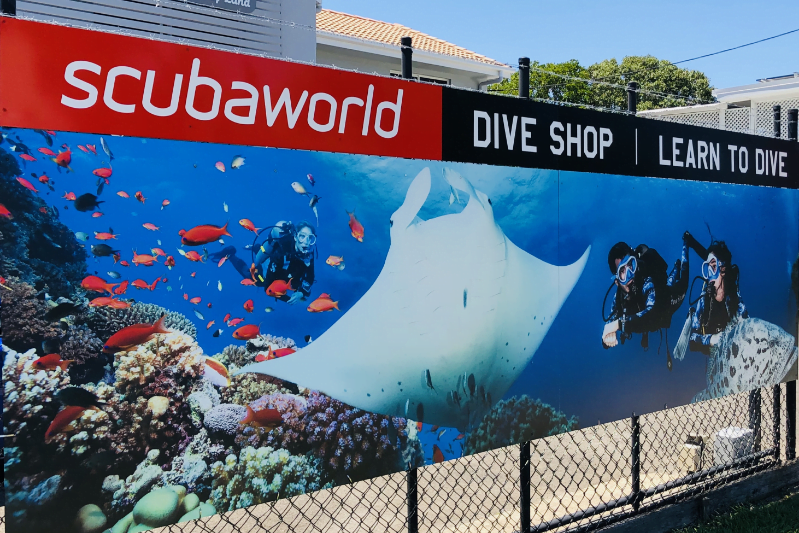David Mullins – Nudibranch Defences
Join us Thursday 30th Jan at 5:30pm to hear David Mullins talk about nudibranch defences

If you’re a keen diver but haven’t yet been on a reef dive, then you’re in for a treat. Reef dives are like nothing else in the diving world, offering you a chance to see an enormous array of marine life up close and personal.
Many people worry about the sustainability of reef dives, and for a good reason. Untrained divers can disturb vital sediment and damage the reef by touching it. Fortunately, with the proper training and technique, the risk of harming natural ecosystems is small. Divers can explore these natural wonders today while leaving them intact for future generations.
If you’re still worried about disturbing natural reefs, you do don’t actually have to include them in your 2020 dive list to get reef experience. Take ex-HMAS Brisbane, for instance, the Australian warship scuttled off the Sunshine Coast following decommissioning by the authorities in 2005. Over the last fifteen years, corals and other organisms have made the sunken hull their home, creating an artificial reef just off the coast. Not only is the reef man-made, but it is just a few kilometres out to sea, making it easy to access.
When it comes to reef dives to put on your 2020 list, you’re spoiled for choice.
Take Komodo in Indonesia, for instance. The isolated island, famous for the giant Komodo dragon lizards that prowl its beaches, is home to one of the most spectacular offshore reefs in the world. Researchers estimate that the ecosystem is home to more than 1,000 species of reef animals, including manta rays, dolphins and practically every species of fish you can imagine.
Another popular destination for divers is Wakatobi, also in Indonesia. This UNESCO Biosphere reserve is a conservation triumph, famous for the schools of seahorses that throng its depths. It is popular among both scuba divers and snorkelers, owing to its shallow turquoise waters and green sea turtles that munch on the seagrass on the seabed.
If you head north from Queensland, you’ll eventually reach Kimbe Bay in Papua New Guinea, a quiet sanctuary for wildlife, untouched by civilisation. Here you’ll find a stunning reef, ranked as one of the world’s best by National Geographic magazine, with more than 200 dive sites.
Be warned: the reefs here are pristine, meaning that divers have a lot of responsibility to keep them that way. It is a popular haunt among dolphins and barracuda – scary-looking fish with big, sharp teeth. Nearby is the crash landing site of a WWII Japanese fighter plane, also fun to explore.
If you plan on heading a little further afield, be sure to check out the Tubbataha National Park in the Philippines. The protected site covers some 10,000 hectares of pristine reef and is considered by UNESCO as one of the seven wonders of the sea. For many, it is the best place in the world to see whales, with more than thirteen species regularly visiting its waters.
Scuba World offers dive trips to a range of notable locations in both Australia and abroad. For those who love whale watching, we operate adventures to Hervey Bay where you can get up close and personal with mysterious humpback whales. We also arrange trips to the SS Yongala and the Great Barrier Reef, allowing you to see the world’s most magnificent coral reef with your own eyes.
With us, you can also go on international diving holidays. We organise trips to Micronesia Truk Lagoon, the final resting place for more than one hundred WWII submarines, planes, and ships. Here you can see for yourself how this magical, man-made reef has developed over the years and provided the ideal scaffold for new coral to form.
Scuba World also organises trips to Vanuatu Island. Here divers can experience the pristine waters of this relatively unknown island and learn more about the diving culture in the South Pacific. It is an excellent location for beginners.
With so many opportunities for reef diving in Australia and beyond, it is definitely a type of diving that you need to include on your list for 2020. In case you weren’t sure why you should go reef diving this year, here are some reminders:
So what are you waiting for? Book your trip with us today and grab and experience of a lifetime.
Join us Thursday 30th Jan at 5:30pm to hear David Mullins talk about nudibranch defences
Dear members, I would like to take this opportunity to inform you about a few
SUNRISE DIVES ARE BACK!!! Dear member, Mon 23rd & Mon 30th Sept we are diving

If you can’t find what you are looking for, complete the form below to ask a question




Copyright 2022 Scubaworld | Web Design Mindbomb